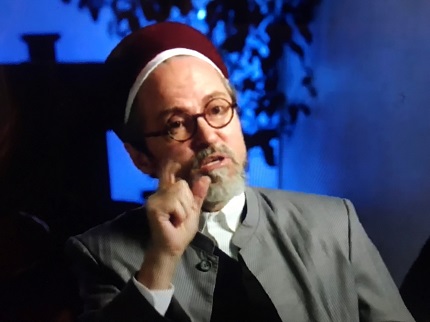Shaykh Hamza Yusuf Spotlights Jewels of the Qur’an
By Elaine Pasquini

Berkeley, CA: Following the onset of Ramadan, the month for fasting and quiet reflection by Muslims around the world, Shaykh Hamza Yusuf, president of Zaytuna College and a highly acclaimed and gifted Muslim scholar, shared his thoughts on this special observance in an April 4 online program.

“The month of Ramadan is always a month of going back to the book of Allah for those who have neglected it for the other 11 months of the year,” Yusuf said. “For those who actually have a practice, it’s a way of increasing it, intensifying it.”
For Muslims who may not regularly study the Qur’an, the shaykh urged them to “use this month to establish a practice that you continue on after the month. Even if it is a half a page a day, there should be some commitment to the Qur’an.”
Yusuf pointed out that despite its extraordinary eloquence, “the Qur’an is very, very minimalist. It has a really stunning conciseness.”
Sharing his love of reading and learning, Yusuf stressed the importance of Al-Mustasfa, the last of 70 books by Imam Al-Ghazali, considered the best student of Imam Al- Haramain Al-Juwayni, one of the most brilliant jurists and Islamic history scholars of the twelfth century.
Al-Ghazali introduced an extraordinary new way of looking at the Qur’an, Yusuf said. He established many important new technical terms that had not been used before and went deep into finding the reasons for rulings and how they are applied, Yusuf noted.
Al-Ghazali was attempting to introduce what in the West is called “liberal arts,” Yusuf, co-founder of Zaytuna College, a Muslim liberal arts school, explained. “Our tradition is rooted in these fundamental arts that enable people to think qualitatively and quantitatively,” which includes “logic as a central art.”
One of Al-Ghazali’s contentions is everything in creation has a meaning and the physical presence of it has to be penetrated in order to get to the meaning.
The Essential Qur’an: The Heart of Islam , translated by Thomas Cleary, “did us a great service because it is an incredibly accessible book for a lot of people to get to the heart of the Qur’an without having to read the entire Qur’an,” Yusuf said. “The introduction of the book gave a beautiful summation of the purpose of the Qur’an.”
For whatever reason, Yusuf explained, “English has become a pre-eminent Islamic language. It’s the language of academia. Many people from other countries write in English. Scientific papers mostly have to be published in English to be well read, so it has become an important religious language.”
“We forget that the South Asians were colonized from the late 18th century until 1947,” he continued. “The Indian sub-continent, one of the most important lands of Islam, was colonized by the British who basically instituted English as a formal language in education.”
The South Asians became very skilled in English. Many of them read English literature and for that reason some of the best translations of the Qur’an were originally produced by South Asians who wanted to address the mistranslations of the ones that were in English translated usually by Protestants who wanted to proselytize in the Muslim world, Yusuf said.
The Koran by Bruce Lawrence is an excellent English translation of the Qur’an, he said, noting the word “Koran” is the English translation of the Arabic “Qur’an.”
Yusuf mentioned the importance of The Lights of Revelation and the Secrets of Interpretation by the 13th century Muslim scholar Nasir Al-Din Al-Baydawi, with notes and translation by the acclaimed Lebanese-born scholar and author Dr Gibril Fouad Haddad.
“If you want to take a deep dive into how our great scholars looked at the Qur’an, this is the first hizb (group) of the Qur’an translated,” he said. “It has Arabic in it, is meticulous and stunning.”
“The Qur’an is a roadmap,” Yusuf observed. “It is the users’ manual for the human being. It gives us the ability to navigate our lives. But it is a map, and you have to learn it and make it operational.”
(Elaine Pasquini is a freelance journalist. Her reports appear in the Washington Report on Middle East Affairs and Nuze.Ink.)
-----------------------------------------------------------------------------
Back to Pakistanlink Homepage

